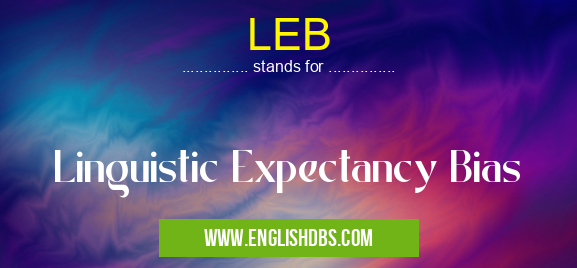What does LEB mean in LINGUISTICS
Linguistic Expectancy Bias (LEB) is a cognitive bias that occurs when individuals interpret language in a manner that aligns with their expectations or beliefs. It influences how people process, understand, and recall information, potentially leading to biased judgments and decision-making.

LEB meaning in Linguistics in Academic & Science
LEB mostly used in an acronym Linguistics in Category Academic & Science that means Linguistic Expectancy Bias
Shorthand: LEB,
Full Form: Linguistic Expectancy Bias
For more information of "Linguistic Expectancy Bias", see the section below.
Definition
LEB refers to the tendency for individuals to interpret ambiguous or uncertain language in a way that confirms their preexisting assumptions or expectations. This bias arises due to the human brain's natural inclination to seek coherence and consistency in information processing.
Causes
- Confirmation bias: Individuals tend to seek information that confirms their existing beliefs, while disregarding evidence that contradicts them.
- Schema theory: People possess mental frameworks (schemas) that influence how they categorize and interpret new information. LEB occurs when new information is interpreted to fit existing schemas.
- Cognitive dissonance: Individuals experience psychological discomfort when their beliefs are challenged. LEB helps reduce dissonance by aligning incoming information with existing beliefs.
Consequences
- Biased judgments: LEB can lead to biased judgments and interpretations, as individuals may overlook or undervalue evidence that contradicts their expectations.
- Miscommunication: LEB can cause misunderstandings in communication, as different individuals may interpret the same language differently based on their own expectations.
- Decision-making errors: LEB can influence decision-making by leading individuals to favor options that align with their expectations, even if they are not objectively the best choices.
Essential Questions and Answers on Linguistic Expectancy Bias in "SCIENCE»LINGUISTICS"
What is Linguistic Expectancy Bias (LEB)?
Linguistic Expectancy Bias (LEB) refers to the tendency for people to interpret language in a way that aligns with their prior expectations or beliefs.
How does LEB affect language comprehension?
LEB can lead individuals to perceive and process information in a biased manner. If a person expects a particular outcome, they may interpret language in a way that supports that expectation, even if the language is ambiguous or open to multiple interpretations.
What are some examples of LEB in action?
One example of LEB is the "halo effect," where people tend to attribute positive qualities to individuals they perceive as attractive. Another example is the "confirmation bias," where people seek out information that supports their existing beliefs and disregard information that contradicts them.
How can LEB be mitigated?
Mitigating LEB involves being aware of its potential influence and actively seeking out diverse perspectives. By acknowledging our biases and considering alternative interpretations, we can reduce the impact of LEB on our language comprehension and decision-making.
Why is it important to understand LEB?
Understanding LEB is crucial for individuals who want to engage in effective communication, critical thinking, and unbiased decision-making. By being aware of this cognitive bias, we can make conscious efforts to minimize its influence and promote a more balanced and objective understanding of language and information.
Final Words: Linguistic Expectancy Bias is a cognitive bias that can significantly impact how individuals process and interpret information. It highlights the importance of considering the influence of expectations and assumptions in communication and decision-making. By being aware of LEB, individuals can strive to approach information objectively, challenge their expectations, and make more informed judgments.
